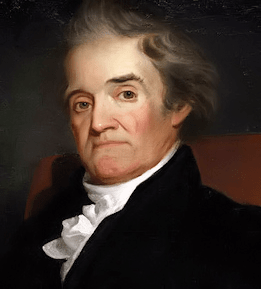Textus Receptus Bibles
Noah Webster's Bible 1833
| 2:1 | And again he entered into Capernaum, after some days; and it was understood that he was in the house. |
| 2:2 | And forthwith many were assembled, so that there was no room to receive them, no not so much as about the door: and he preached the word to them. |
| 2:3 | And they come to him, bringing one sick with the palsy, who was borne by four. |
| 2:4 | And when they could not come nigh to him by reason of the crowd, they uncovered the roof where he was: and when they had broken it up, they let down the bed on which the sick with the palsy lay. |
| 2:5 | When Jesus saw their faith, he said to the sick with the palsy, Son, thy sins are forgiven thee. |
| 2:6 | But there were certain of the scribes sitting there, and reasoning in their hearts, |
| 2:7 | Why doth this man thus speak blasphemies? who can forgive sins but God only? |
| 2:8 | And immediately, when Jesus perceived in his spirit that they so reasoned within themselves, he said to them, Why reason ye these things in your hearts? |
| 2:9 | Which is easier, to say to the sick with the palsy, Thy sins are forgiven thee; or to say, Arise, and take up thy bed, and walk? |
| 2:10 | But that ye may know that the Son of man hath power on earth to forgive sins, he saith to the sick with the palsy, |
| 2:11 | I say to thee, Arise, and take up thy bed, and go into thy house. |
| 2:12 | And immediately he arose, took up the bed, and went forth before them all; so that they were all amazed, and glorified God, saying, We never saw it on this fashion. |
| 2:13 | And he went forth again by the sea-side; and all the multitude resorted to him, and he taught them. |
| 2:14 | And as he passed by, he saw Levi the son of Alpheus, sitting at the receipt of custom, and said to him, Follow me. And he arose, and followed him. |
| 2:15 | And it came to pass, that as Jesus sat at table in his house, many publicans and sinners sat also together with Jesus and his disciples; for there were many, and they followed him. |
| 2:16 | And when the scribes and Pharisees saw him eating with publicans and sinners, they said to his disciples, How is it that he eateth and drinketh with publicans and sinners. |
| 2:17 | When Jesus heard it, he saith to them, They that are in health, have no need of a physician, but they that are sick; I came not to call the righteous, but sinners, to repentance. |
| 2:18 | And the disciples of John, and of the Pharisees, used to fast: and they come, and say to him, Why do the disciples of John, and of the Pharisees fast, but thy disciples fast not? |
| 2:19 | And Jesus said to them, Can the children of the bride-chamber fast, while the bridegroom is with them? As long as they have the bridegroom with them, they cannot fast. |
| 2:20 | But the days will come, when the bridegroom shall be taken from them, and then they will fast in those days. |
| 2:21 | No man also seweth a piece of new cloth on an old garment: else the new piece that filled it up, taketh away from the old, and the rent is made worse. |
| 2:22 | And no man putteth new wine into old bottles, else the new wine doth burst the bottles, and the wine is spilled, and the bottles will be marred: but new wine must be put into new bottles. |
| 2:23 | And it came to pass, that he went through the corn-fields on the sabbath; and his disciples began, as they went, to pluck the ears of corn. |
| 2:24 | And the Pharisees said to him, Behold, why do they on the sabbath that which is not lawful? |
| 2:25 | And he said to them, Have ye never read what David did, when he had need, and was hungry, he and they that were with him? |
| 2:26 | How he went into the house of God, in the days of Abiathar the high priest, and ate the show-bread, which it is not lawful to eat, but for the priests, and gave also to them who were with him? |
| 2:27 | And he said to them, The sabbath was made for man, and not man for the sabbath: |
| 2:28 | Therefore the Son of man is Lord also of the sabbath. |

Noah Webster's Bible 1833
While Noah Webster, just a few years after producing his famous Dictionary of the English Language, produced his own modern translation of the English Bible in 1833; the public remained too loyal to the King James Version for Webster’s version to have much impact.